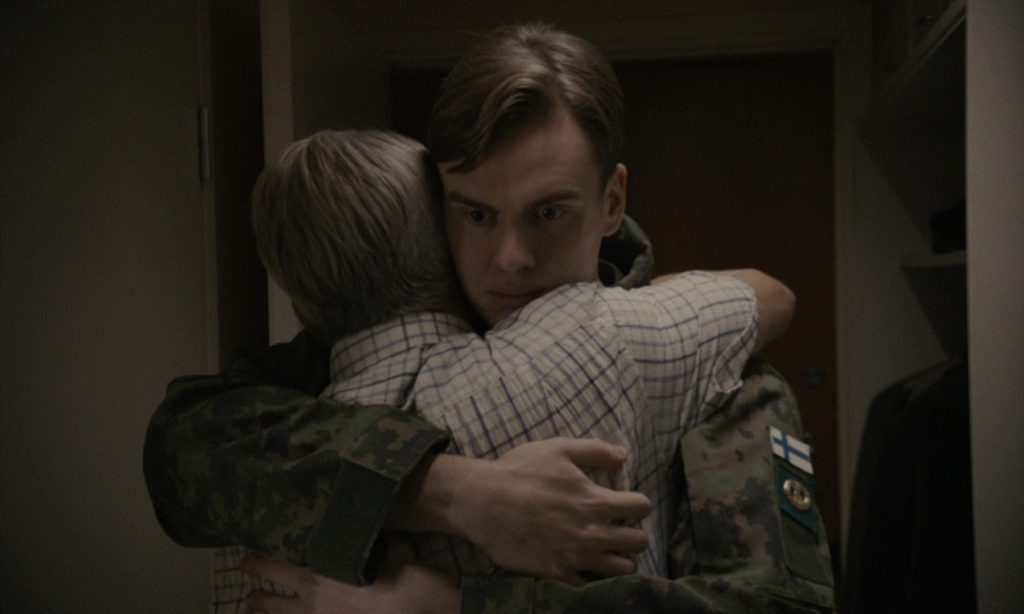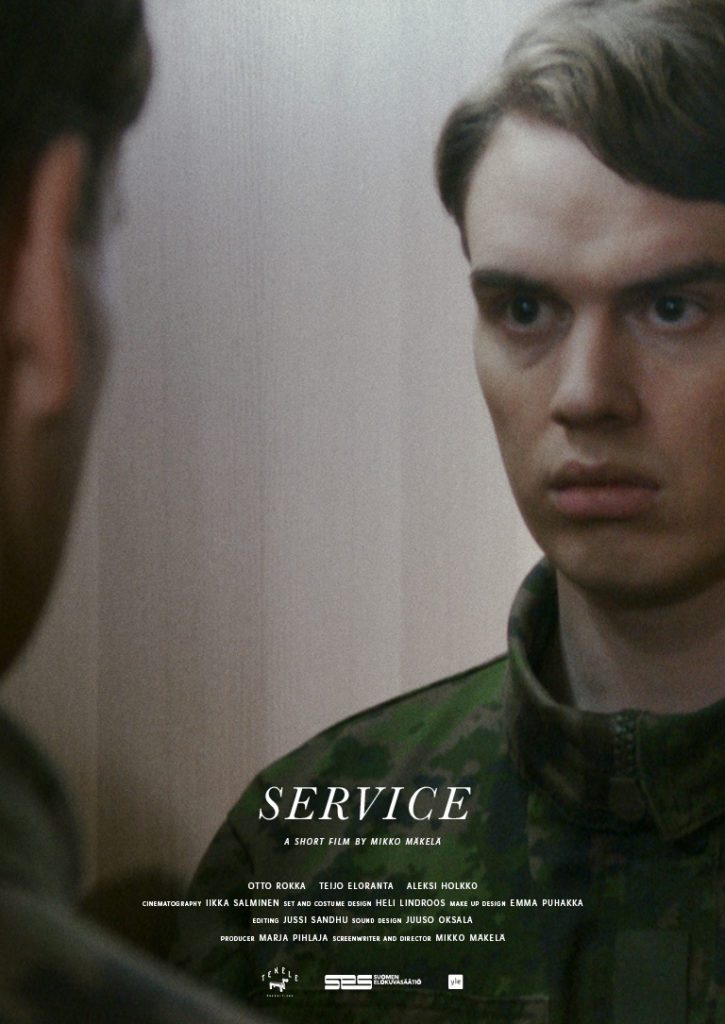导演:米科·梅凯拉
编剧:米科·梅凯拉
主演:奥托·罗卡
制片人:玛利亚·皮赫拉亚 泰约·埃洛兰塔 阿列克西·霍尔科
摄影:伊卡·萨米宁
类型:剧情短片
时长:15分
完成时间:2022
对白语言:芬兰语
字幕:英文
地区:芬兰
制片公司:特克勒制作公司
Director: Mikko Mäkelä
Screenwriter: Mikko Mäkelä
Cast: Otto Rokka, Teijo Eloranta, Aleksi Holkko
Producer: Marja Pihlaja
Cinematographer: Iikka Salminen
Genre: Fiction short film
Length: 15min
Year: 2022
Dialogue: Finnish
Subtitles: English
Region: Finland
Production Company: Tekele Production
故事梗概 Synopsis
服完兵役休假期间,尼科拜访了他疏远了的父亲。旧伤能否痊愈?
On furlough from his military service, Niko pays his estranged father a visit. Can old wounds heal?
导演介绍 Director Biography
米科·梅凯拉是居住在伦敦的芬兰裔英国作家、导演,被IndieWire评为2019年25位崛起的LGBTQ电影人之一。他的导演处女作《芦苇荡的时光》(2017)在全球80多个电影节上放映,并提名英国独立电影奖的发现奖,以及两次芬兰尤西奖(最佳男主角和最佳男配角)。米科是柏林国际电影节天才营(Berlinale Talents)、英国独立电影奖跳板营(BIFA Springboard)的成员以及英国电影协会网络X英国电影学院奖成员(BFI Network X BAFTA Crew)的校友。在首次拍摄电影之前,他曾执导过一些音乐和时尚宣传片,并在电视剧和广告中担任编辑。在他的电影中,米科最感兴趣的是表现酷儿经历、更广泛地探索身份问题,并常常借助边缘化的人物和在社会中格格不入的个体来集中表现。目前,他正在与英国电影协会合作,制作他在英国的第二部电影。
Mikko Mäkelä is a Finnish-British writer/director based in London, named by IndieWire as one of 25 LGBTQ Filmmakers on the Rise in 2019. His feature directorial debut A Moment in the Reeds (2017) screened at over 80 festivals worldwide and was nominated for The Discovery Award at the British Independent Film Awards as well as two Finnish Jussi Awards (Best Actor & Best Supporting Actor). Mikko is an alumnus of Berlinale Talents, BIFA Springboard as well as BFI Network X BAFTA Crew. Prior to his feature debut, he directed a number of music and fashion promos alongside working as an editor in drama and commercials. In his films, Mikko is most interested in representing the queer experience and more broadly exploring questions of identity, often focalised through marginalised characters and individuals at odds with society. He is currently developing his UK-based sophomore feature with the BFI.
导演阐述 Director Statement
对于芬兰国家认同而言,兵役的意义无比重大。除了国防这一主要目的以外,军队在芬兰社会中发挥的核心作用还体现在我们从小就听到的一句话,兵役“将男孩塑造成男人”。似乎只有完成了这一成年仪式,生理性别为男性的芬兰人才能成为一位完全的公民。
直至近日,同性恋在芬兰军队中仍是禁忌,在历史上,正是对恐同症的担忧阻止了许多同性恋男子进入军队——我本人便是如此。考虑到兵役在芬兰社会中的巨大重要性,以及它与传统男性观念的牢固联系所带来的负面心理影响,我感到自己最终不得不在《现役军人》中,以一个迄今未见的同性恋视角来审视这个制度。
这部短片讲述了一位已疏远了的父亲和他的成年儿子重逢的故事,后者在延缓多年后终于进入军队完成服役。在他们见面的过程中,我们了解到,在成长过程中,尼科一直令他的父亲感到失望,因为他偏离了传统的异性恋的男性观念。在影片中,我想通过这样的期望偏差,来审视父子之间的这个楔子,特别是从酷儿的角度,当这些期望与性别角色和表达有关时。将履行兵役视为衡量“男子汉”的标准,也使我能够审视父子关系中的性别表演性:只有在穿上军装后,尼科才能被他父亲认可为“真正的男人”。通过最后的转折,我也希望观众能反思性别表演的肤浅性和潜在的虚幻性,并对芬兰文化中兵役和男性气概的联系进行拷问。通过尼科的“欺骗”,影片还试图反思所谓的善意谎言在帮助弥合两代人之间的差距方面的必要性和道德性。如果尼科的行为能够让他的父亲高兴,让父子俩重新变得亲密,那么他的行为是否不道德?如果只有通过这些行动,尼科才能感受到父亲的接纳和爱,哪怕只是表面上的,那么他的行动能被认为是错误的吗?这部电影可以看作是一个孩子的故事。出于对父母的爱以及这种爱的需要,他们最终似乎准备在自己的身份和意识形态上作出妥协——为了维持家庭关系,孩子如何准备“说他们的语言”。在此基础上,“借来的”制服只是一个具体的例子,以说明我们在生活的不同领域被迫戴上的所有具象的面具,以及我们有时不得不为维持我们的关系而扮演的各种角色。
It’s difficult to overstate the significance of military service for the national identity of Finland. In addition to its primary purpose of defence, the central role played by the armed forces in Finnish society is evident in the saying – that we all grow up hearing – that military service “moulds boys into men” – as if only through completing this rite of passage can a male-bodied Finn become a full-blown citizen.
Homosexuality has remained taboo in the Finnish armed forces until very recently, and it is the fear of homophobia that has historically prevented so many queer men from entering the service – as was the case for myself. Given its outsize importance in Finnish society, and the negative psychological impact of its firm linkage to traditional notions of masculinity, I therefore felt compelled to finally examine this institution from a heretofore unseen queer perspective in Service.
The short drama tells the story of an estranged father and his adult son’s reunion after the latter has finally entered the military to complete his service, following years of deferment. In the course of their meeting, we understand that, growing up, Niko has been a disappointment to his father by diverging from a traditional heteronormative idea of masculinity. In the film I wanted to examine this wedge driven between father and son, through the latter’s failure to conform to the former’s expectations – and this particularly from a queer perspective, when those expectations have to do with gender roles and expression. Viewing (the fulfilment of) military service as a measure of “manhood” allowed me also to examine performativity of gender within the father-son relationship: it’s only once dressed in the military uniform that Niko can be recognized as “a real man” by his father. With the end twist, I also want the audience to reflect on the superficial and potentially illusory nature of gender performance, as well as to interrogate the linkage of military service and masculinity in (Finnish) culture. Through Niko’s “deceit”, the film also seeks to reflect on the necessity and ethics of a so-called white lie in helping to bridge the gap between generations. Are Niko’s actions unethical if they have the power to make his father happy and allow father and son to become close again? Can his actions be thought of as wrong if only through them Niko is able to feel his father’s acceptance and love, even superficially? The film can be seen as a story of a child who, out of love for their parent (and in need of parental love), is ultimately seemingly prepared to compromise their identity and ideology – how, in order to maintain familial relations, the child is prepared to “speak their language”. At its foundation, the (borrowed) uniform is simply a concrete example of all the figurative masks that we are forced to wear in different arenas of our lives, and the various roles we at times have to take on to maintain our relationships.





